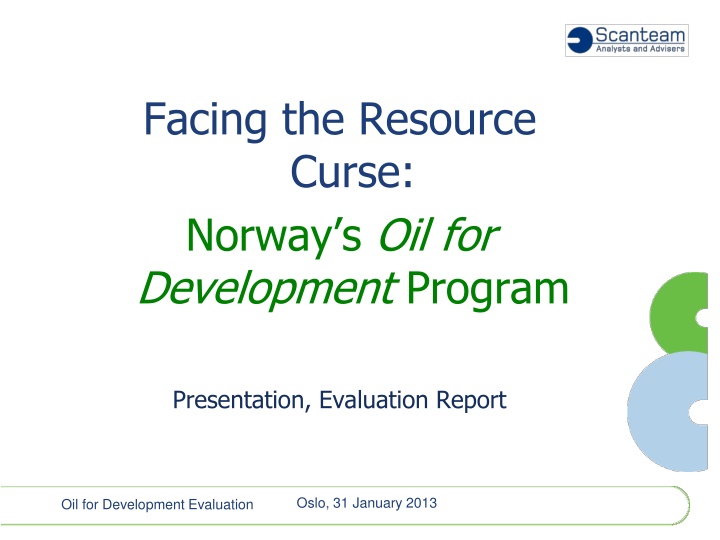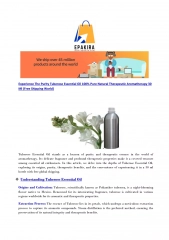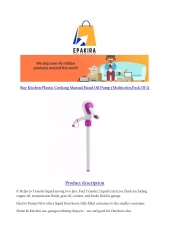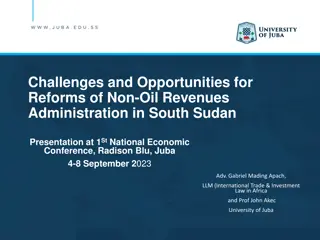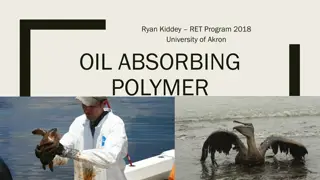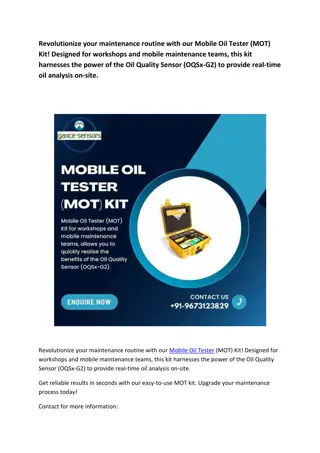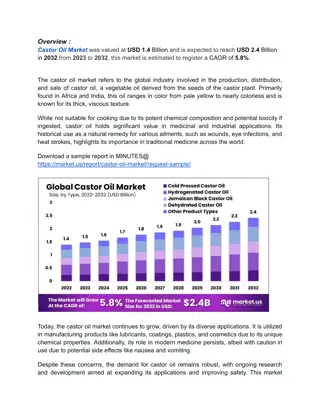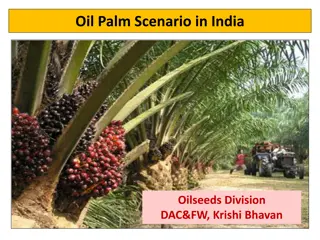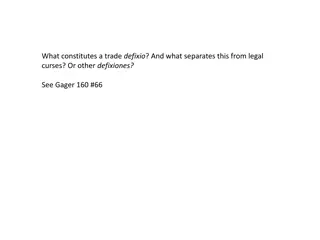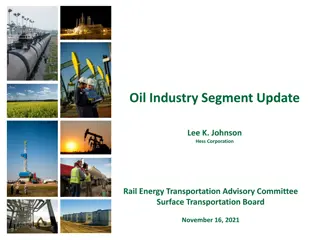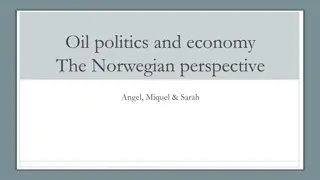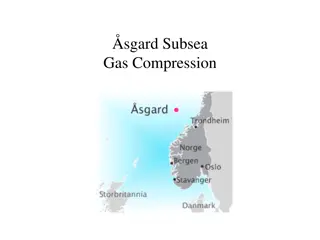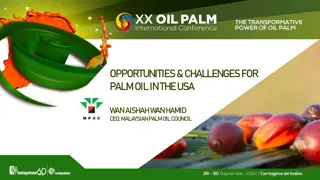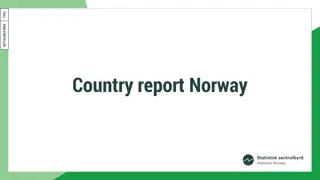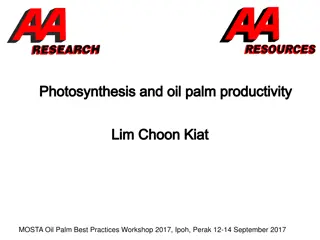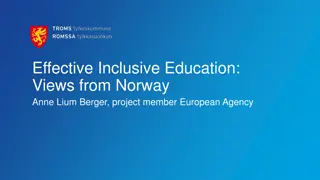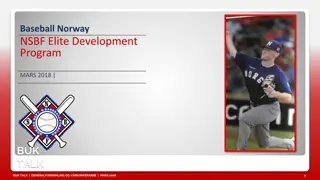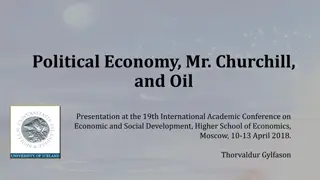Norway's Oil for Development Program: Addressing the Resource Curse
Norway's Oil for Development program aims to manage petroleum resources responsibly to benefit future generations, transforming the resource curse into a blessing. Established in 2005, the program focuses on capacity development, public finance, and environmental concerns in oil economies. It has shown good results in emerging markets but needs to expand its scope for effective resource management globally. With a growing presence in several countries, the program plays a vital role in governance and institutional development in the petroleum sector.
Uploaded on Aug 18, 2024 | 2 Views
Download Presentation

Please find below an Image/Link to download the presentation.
The content on the website is provided AS IS for your information and personal use only. It may not be sold, licensed, or shared on other websites without obtaining consent from the author.If you encounter any issues during the download, it is possible that the publisher has removed the file from their server.
You are allowed to download the files provided on this website for personal or commercial use, subject to the condition that they are used lawfully. All files are the property of their respective owners.
The content on the website is provided AS IS for your information and personal use only. It may not be sold, licensed, or shared on other websites without obtaining consent from the author.
E N D
Presentation Transcript
Facing the Resource Curse: Norway s Oil for Development Program Presentation, Evaluation Report Oslo, 31 January 2013 Oil for Development Evaluation
Oil for Development: The Goals Operational Objective: Economically, environmentally and socially responsible management of petroleum resources which safeguards the needs of future generations The Concern: Transform Resource Curse to Blessing : Oil should be a blessing, not a curse. This means that petroleum revenues should be used to provide essential services for the many, and not be allowed to disappear into the pockets of the few; local communities should experience new economic opportunities from petroleum activities and not have their environment threatened (OfD 2008, p. 3) Broad political consensus 2005: Designed by out-going Centre-right government implemented/amended by in- coming Red-Green government 1 1 Oil for Development Evaluation Oslo, 31 January 2013
OfD: A Flagship Program Building on petroleum sector support Sector assistance since 1980s to several countries Evaluation 2006: good results in emerging-, limited in mature oil economies; good management, legal results; flexible; too limited in scope: need to address larger resource management dimensions 2005: Oil for Development (OfD) approved: Broad consensus: include public finances, environment; program managed from own Secretariat in Oslo; based on demand-driven requests; focus on locally-owned capacity development Built around three pillars , sharing Norwegian experience/ public services, strong political support through 4-ministry Steering Committee led by MFA, governed by R-notat OfD addressing strategic sector at policy, institutional, organisational levels across the globe OfD most visible program providing Norwegian expertise 2 2 Oil for Development Evaluation Oslo, 31 January 2013
OfD: Rapidly growing program (mill NOK) 350 18 16 300 OfD Disbursements, mill NOK 14 250 Number of countries 12 200 10 8 150 6 100 4 50 2 0 0 2006 2007 2008 2009 2010 2011 2012 OfD Core countries Non-core countries OfD now just above 1% of Norwegian aid Most important petroleum governance program globally Number of OfD countries falling 3 3 Oil for Development Evaluation Oslo, 31 January 2013
Important Results Produced Most consistent achievement: institutional development Modern legal framework, regulatory regimes/institutions, allo- cation/concession policies, reporting systems in place/improved Implemented/operationalised through organisations/ offices with better capacities, performance, ownership/leadership Gains fragile, thin: capacity to reproduce capacity often lacking improved public sector skills move to non-state actors Resource pillar most solid, finance pillar facing high demand, environment pillar evolving: Petroleum pillar w/ long history, experienced Norwegian actors (NPD, Ptil, Petrad); strong and interested local counterparts Finance pillar: limited to MinFin staff due to concerns about quality of advice in sensitive policy areas; working w/ IMF, Tax for Dev t; wish to limit engagement to two states due to own capacity constraints Environment pillar: most recent; complex field w/ often weak local counterparts; CSO involvement often sporadic, not integrated into OfD; programs evolving but still agreements lacking, results very incipient 4 4 Oil for Development Evaluation Oslo, 31 January 2013
Outcomes, Resource Pillar Mozambique Timor-Leste Uganda Ghana South America Resource - Management Pillar Institution level Ok, Structure formed Structure in sector good Structure Formed Bolivia: New Pet Law in parliament Structure of sector clear Laws, policies and regulations in line with good int l practice in place Started , but regulations are still missing Pet. Law in Parliament Regulations missing Frameworks laws, reg ions largely ok being updated by Moz staff with only some NPD support Revising Pet. Law, most regulations missing, not passed Ecuador: no legal effect. Nicaragua: Legal framework established 1998 Ok Organisation level Public sector bodies in place, staffing and mandates ok. Ok, but uncertain sustainability, New law on Petroleum supervision, only head appointed no staff Bolivia: ANH in place, twin with NPD, depending on passing Petroleum Law. Appropriate public sector bodies in place with adequate structure, staff, resources, mandate and contact to OfD program More staff than TL and better recruiting ground. Twinning ok Minimum critical mass of staff in place, but vulnerable. Still huge task in staff training, and in securing resources Twinning with NPD working well Ecuador: Run by TNCs, wish to change. Very good recruiting possibilities compared to other countries. Nicaragua: Twin to NPD, lack capacity in production phase Positive National ownership Bolivia and Ecuador: Companies try to maintain power Positive Positive Positive Strong national political commitment to structure and functioning of sector National actors feel in charge of sector dynamics Confidence strong but now huge finds in north means actors, forces rapidly changing Confidence strengthened, but still dependent on advisors National actors feel quite confident National oil company Yes, but government offices No Nicaragua: Positive Yes 5 5 Oil for Development Evaluation Oslo, 31 January 2013
Outcomes, Revenue Pillar Mozambique Timor-Leste Uganda Ghana South America Resource - Management Pillar Institution level OfD has not contributed Significant contribution from OfD although tax management needs further strengthening. Weak institutions and governance context represent challenges Too soon to see significant contribution from OfD. OfD no significant contribution OfD has had no significant contribution. Structure of sector clear Laws, policies and regulations in line with good int l practice in place Organisation level OfD no significant contribution Significant contribution within MoF, Central Bank, some achievements in petroleum tax unit. High vulnerability to turn-over and critical mass of adequate counterparts still not in place Limited support towards specific activities. First step taken to define needs No significant contribution from OfD Some useful policy advice and analytical work Appropriate public sector bodies in place with adequate structure, staff, resources, mandate and contact to OfD program National ownership Strong national political commitment to structure and functioning of sector National actors feel in charge of sector dynamics Strong Strong Strong Strong Not assessed MinFin in charge in public sector, Parliament in debate with presidency (Tax for Development active in Moz) As capacity increasing so is also feeling of being in control and able to set the agenda National actors including civil society strongly engaged Strong civil society in most of the countries 6 6 Oil for Development Evaluation Oslo, 31 January 2013
Outcomes, Environmental Pillar Mozambique Timor-Leste Uganda Ghana South America Resource - Management Pillar Institution level Environmental regulation reasonable. Legislation in place. Subordinate regulation is lacking. Special environmental policies/ legislation/ regulation have not been drafted/ amended. Current regulations inadequate for environmental protection of Agency s oil and gas functions. Quite good legal framework but very limited implementation Structure of sector clear Laws, policies and regulations in line with good int l practice in place SEA/IEA/compliance monitoring systems still inadequate Organisation level Capacities weak in view of large off- shore finds. OfD support integrated into wider frame of capacity development co- ordinated by MICOA and Netherlands Lack fundamental environmental capacity. Capacity overburdened. Weak co-ordination between Ministry and Environmental Commission and Norwegian agencies. Relatively strong administration. Ambitious program coordinated with Norwegian Climate and Pollution Agency Frequent shifts in administration. Only sporadic Norwegian cooperation/ follow-up Appropriate public sector bodies in place with adequate structure, staff, resources, mandate and contact to OfD program National ownership Long term OfD advisor helped to push program forward. Roles of official bodies to be clarified. Joint new co- operation agreement to be developed. Long term OfD advisors in place. Weak government participation. Extra efforts need to be made. Role of Norwegian Embassy section to be clarified/ specified Strong national political commitment to structure and functioning of sector 7 7 Oil for Development Evaluation Oslo, 31 January 2013
Sector Governance: Growing Challenges No. of petroleum economies up, many in fragile states: Studies note democracy reversals due to oil curse : elites, companies collude to share economic rent, hide taxable incomes Oil is particularly vulnerable to elite capture danger that more efficient state means more rent seeking/corruption Does petroleum sector create negative gender effects? In public sector, women seem to do well in private sector/ production fields, male bias Real challenge: petroleum crowding out sectors important to women? Need to re-think gender strategies? Need much more knowledge about sector fundamentals OfD needs to put governance at centre of program OfD will thus need strategic alliances at national, inter- national levels, including with non-state actors 8 8 Oil for Development Evaluation Oslo, 31 January 2013
Pillar Structure: Strengths and Rigidities Pillar structure reflects current Norwegian public sector: Makes the three OfD dimensions visible, clear, strategic Eases mobilisation of Norwegian public pillar -skills but creates barriers to entry for others need other agreements Local roles/tasks (Health/Security/Environment), monitoring/ reporting, IEA/SEAs often not aligned with OfD pillars Overarching (governance) issues not a pillar responsibility Norway: aid partner business actor issue? Concern that OfD not advise in areas of private sector action since Norway (Statoil) may appear conflict-of-interest OfD not supporting areas of key interest to partners Dilemma OfD structure the best for providing services? OfD covering all critical needs along value-chains when deciding issues to address? 9 9 Oil for Development Evaluation Oslo, 31 January 2013
Technical Cooperation (TC) Organisational twinning: Many strengths, good results Demand-driven, timely, relevant support Continuity in links trust, flexibility, adjusting to needs Framework agreements provide access to wider skills-base As strength is technical areas, other fields squeezed: Organisational, capacity building: In Norway, we out-source Quality assurance responsibilities Focus on (kn)own fields Regional collaboration, peer learning, new experiences? While regional programs increasing in importance, local knowledge, experience could be used much more Collaboration with non-state actors remains incipient Much of TC good though within the box , technical Vast non-Norwegian skills/experience base under-utilised 10 10 Oil for Development Evaluation Oslo, 31 January 2013
OfD: Facing the Future? OfD: Extremely popular - becoming over-extended? Many countries wish to join but OfD reducing numbers: Concern that OfD over-extended: facing management reach & skills limitations, too many countries with differing needs OfD delivering into politically sensitive, technically complex areas requires close oversight, strong political support OfD imposing self-limitations should be more inclusive Norwegian experience relevant but not unique many other experiential lessons available, much wider skills-base exists OfD as core component in larger international governance alliance Engage with multilaterals, bilaterals, EITI, CSOs Scale own role to regional conditions OfD role in Latin America different from Africa so reach can be enlarged ! OfD has unique credibility, potential Possible to extend influence, impact, long-term governance results 11 11 Oil for Development Evaluation Oslo, 31 January 2013
Recommendations: Strategic Program 1. OfD remains priority program for Norway Provide on budget line for predictability, accountability Expand program/funding if results appear possible/likely 2. Maintain focus on poverty reduction, operational goals Ensure long-term, broad-based vision, with the governance and distributional dimensions this implies Ensure local voice in management - embassies critical 3. Oil Curse Blessing should be key concern Understand local political economy/actors Track the complete value-chain Identify action points for OfD 4. Strengthen international governance partnerships Oil curse is deliberate addressing it requires alliances: national governments, multilaterals, bilaterals, knowledge centres, civil society, media, parliamentarians 12 12 Oil for Development Evaluation Oslo, 31 January 2013
Recommendations: Governance is core 5. Good Governance (GG) as core and visible component Operational GG program with funding, targets, clear partners 6. Country selection linked to GG prospects/performance Keep core non-core distinction to define OfD intensity Increase OfD countries where GG potential seems positive Have clear Exit strategy for success, and failure 7. Strengthen regional, South-South collaboration Broaden resource base for learning, sharing Support regional collaborations as important part of OfD 8. Restructure program, governance structure, admin Broaden program contents, less rigid pillars Move from secretive R-notat to transparent policy basis Delegate more to field where feasible 13 13 Oil for Development Evaluation Oslo, 31 January 2013
Recommendations: Widen Contents 9. Petroleum management: Extend to complete value chain Support countries commercial decisions: biggest problems often related to good handling of large-scale benefits realising this may raise conflict of interest issues for Norway 10. Revenue management: Expand OfD delivery capacity Ensure OfD has range and depth of skills through use of wider networks 11. Environmental management: Wider, strategic reach Identify local actors for broad-based capacity development support, appropriate use of key tools (SEAs, EIAs etc) Strengthen compliance monitoring, polluter pays policies 12. Prepare OfD advisers for more complex roles, situations Ensure advisers trained beyond technical fields: to build capacities in contested fields in context-sensitive places 14 14 Oil for Development Evaluation Oslo, 31 January 2013
Recommendations: Realistic? A more decentralised governance approach? In line with general Norwegian, DAC aid principles, Busan 2011 (fragile states) agreement, practice of other donors Governance is context-specific Stronger field role Stronger and bigger national and international alliances? Building political support: U-4 on anti-corruption Extractive Industry Transparency Initiative/EITI Sector approach to governance strategic? Brings in the actors that need to be involved Anti-corruption lesson: challenges largely sector specific Good frameworks good governance performance requires good strategies and implementation! 15 15 Oil for Development Evaluation Oslo, 31 January 2013
Oil for Development: The Future Operational Objective remains fully relevant: Economically, environmentally and socially responsible management of petroleum resources which safeguards the needs of future generations The Concern is, if anything, greater today than in 2005: Oil should be a blessing, not a curse. This means that petroleum revenues should be used to provide essential services for the many, and not be allowed to disappear into the pockets of the few; Need to re-affirm the broad political consensus from 2005 Need to expand our horizon to handle the more complex governance issues Need to invite in more hands to tackle the challenges Need to provide the admin/mngt resources for the job 16 16 Oil for Development Evaluation Oslo, 31 January 2013
